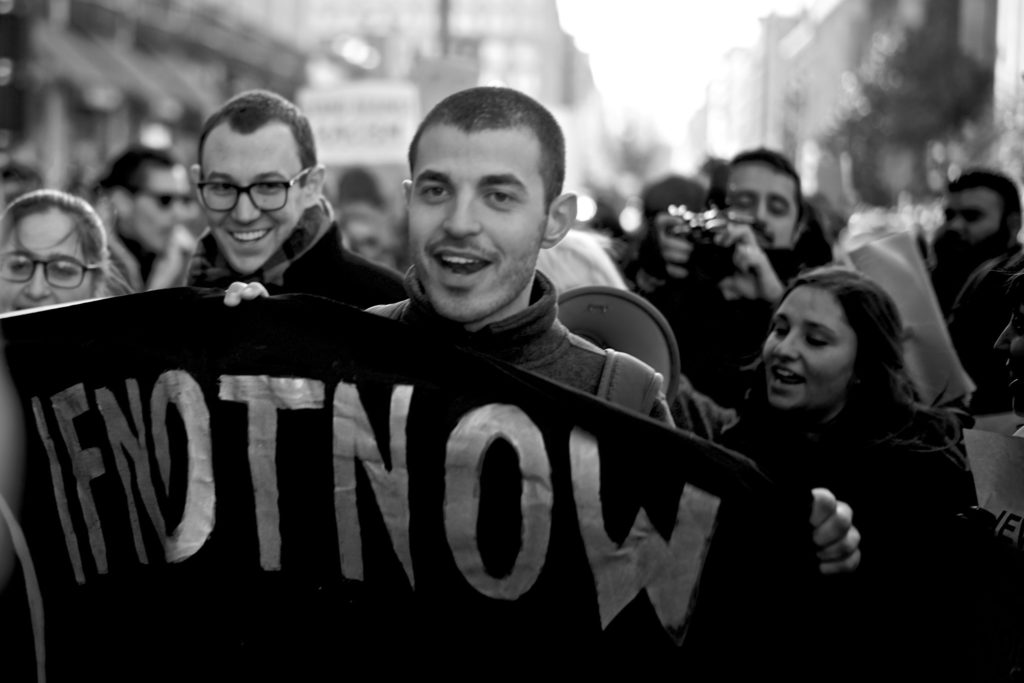
The flag of Israel has been spotted in white nationalist displays of violence such as the insurgency of January 6, 2021. The Star of David was there. There were also white men wearing shirts that read “Camp Auschwitz,” “Arbeit macht frei,” and “6MWE” (a neo-Nazi slogan meaning “6 million wasn’t enough”). These are obvious expressions of antisemitism that reveal a strange and explosive interweaving with Zionism, or rather Israelism. Years of Israeli hasbara (or propaganda) and its elective affinities with the Christian Zionism that has permeated white American evangelicals brought us this moment of “love of Israel” that wants to kill Jews. The absurdities are in plain sight. This constitutes the tragic upshot of Israel’s weaponization of antisemitism to muzzle legitimate criticisms of its continuous occupation of Palestinians, now labeled “apartheid” by B’Tselem, an Israeli human rights’ organization. On the global scene the Israeli efforts have been amplified by the IHRA (International Holocaust Remembrance Alliance) which has gained traction globally as a mechanism designed to delegitimize criticism of Israeli policies, diminish the Palestinian struggle for dignity and human and political rights, and enhance militant ethnoreligious nationalism in Israel. Framing itself as an intergovernmental effort to combat antisemitism, the IHRA thus has consolidated a definition of antisemitism to better determine what it looks like in political and social life, with the intention to uproot and criminalize criticisms of Israeli policies. One of the IHRA’s list of examples of antisemitism includes “denying the Jewish people their right to self-determination, e.g., by claiming that the existence of a State of Israel is a racist endeavor.” The ramifications of the IHRA’s definition of antisemitism reverberate loudly. To begin with, in so far as the insurgency on Capitol Hill in January 2021 displayed its support of Zionism through use of the flag, this support is not inconsistent with the explicit antisemitism captured in the shirts and other neo-Nazi paraphernalia. White nationalists take from Euro-Zionism’s textbook aspirations for ethnoreligious supremacist political hegemony. There is no room for Jews in “White nationalism” as articulated by the likes of Richard Spencer who has expressed admiration of Zionism’s ethnocracy. The ramifications of the IHRA’s nationalist discourse also reverberate, for example, in the U.S. State Department’s labeling as “antisemitic” the long-established practice of nonviolent actions of Boycott, Divestment, and Sanction (BDS) campaigns. Antisemitism, like other forms of racism and bigotry, should be rejected by appeals to human rights and justice, not through the closure of critical thinking and blind acceptance of official Israeli state policies.
The IHRA’s promotion of its understanding of antisemitism is the latest attempt to instrumentalize antisemitism to control how people are allowed or not allowed to talk about Israel. This account of antisemitism, however, is only possible through the flawed equation of Israel with all Jewish people, forcing all Jews the world over to accept and endorse a military occupation and a country that is increasingly more aligned with the wave of neo-fascism sweeping the world than with international law, democratic values, human rights, pluralism, and racial justice. Prime Minister Benjamin Netanyahu seems to be much more comfortable with the likes of Victor Orbán, whose consolidation of power has thrived on antisemitic tropes (along with homophobic, anti-LGBTQI, and anti-feminist rhetoric), than with the American Jews whose social justice activism I trace in my recent work and who channel Jewish values of solidarity with the marginalized and powerless “because Jews were slaves in Egypt.” For this reason, the Jewish people I engaged in my ethnographic work recite the lesson of the Passover story. For them, the lesson of the Holocaust ought not be the maintenance of an ethno-nationalist ghetto via a massive security and surveillance infrastructure. While the Israeli government renders such young Jewish activists pursuing anti-occupation outlook as a “threat”—as is evident in the elaborate surveillance of campus activism—the same government engaged in pomp and circumstance for antisemitic and Islamophobic white Christian evangelicals when they relocated the American embassy, which was formerly in Tel Aviv, to Jerusalem. This is an expression of the marriage of convenience between Christian Zionists, the U.S. Republican Party, and the right-wing Israeli agenda. This marriage is bad for the prospect of a just peace for Palestinians and Israelis, as well as for Jewish safety. The IHRA, the Israeli government, and its “friends” all tell Jews that they can only be safe as long as they are Zionists. President Trump chillingly told representatives of the American Jewish community on the occasion of Rosh Hashanna 2020, “we love your country,” suggesting they are not Americans. Ironically, one of the IHRA’s examples of antisemitism also includes: “accusing Jewish citizens of being more loyal to Israel, or to the alleged priorities of Jews worldwide, than to the interests of their own nations.”
Jews who resist their equation with the occupation assume as their mantra the ancient Rabbi Hillel’s three interrelated questions: If I am not for myself, who will be for me? If I am only for myself, what am I? If not now, when? For them the weaponization of the legacy of antisemitism and the memories of the Holocaust, which many of them carry within their own families, is threatening and wrong both because it manipulates such memories and because it makes them less safe in the face of real and accelerating antisemitism in the U.S. and elsewhere. Many young activists increasingly recognize that their safety depends on linking the fight against antisemitism to other social justice struggles. Many Israelis have taken to the streets to protest Netanyahu’s regime and many others such as B’Tselem for years have decried the weaponization of antisemitism. Their critical voices are silenced within the entrenched ideological regime that the IHRA represents as it coalesces with white nationalist and Christian Zionist antisemitism. Most importantly, this regime renders invisible and inaudible the Palestinian struggle for human rights and dignity that is pivotal for a real peace. A real peace is not the “peace” or normalization of Israel’s relations with Bahrain, the Emirates, Morocco, Sudan and other political entities that were in no direct war with Israel. This push for “normalization” (in the form of arm deals and economic incentives orchestrated by the U.S.) in conjunction with the chilling effect of IHRA on free speech is therefore bad for Jews, Israelis, and peace with justice.

